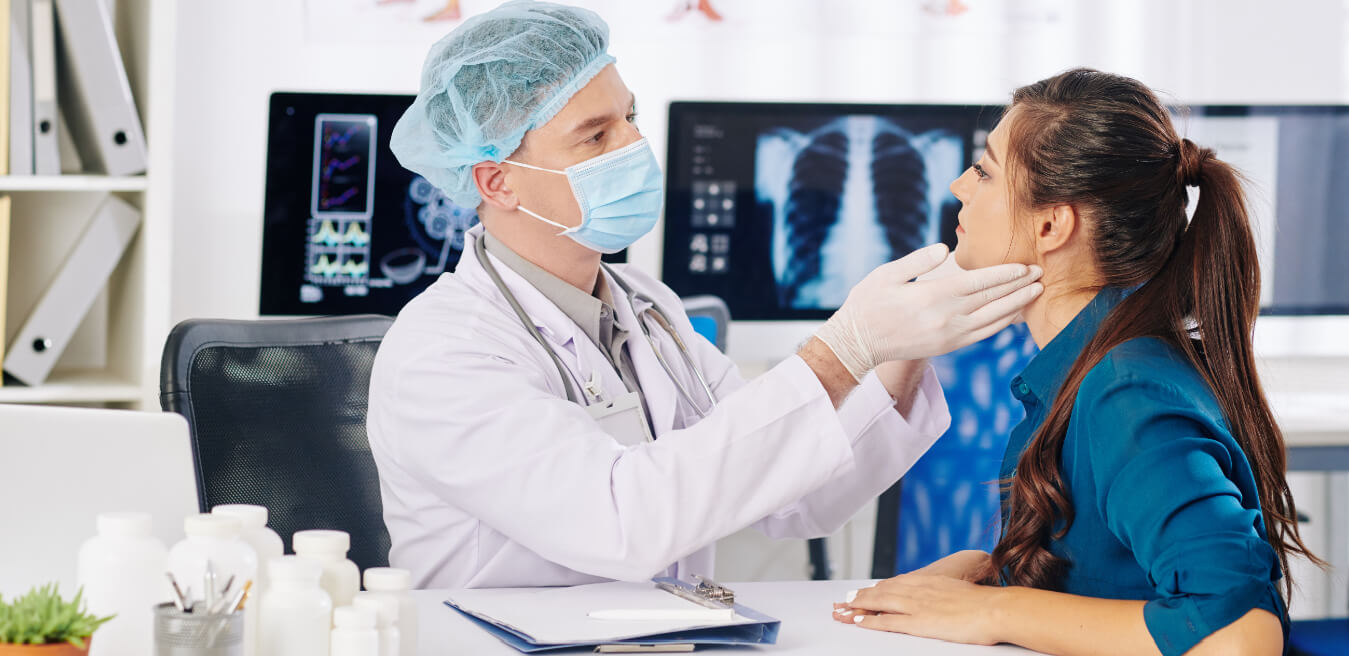- Thyroid is the largest endocrine gland in the body. It is located in the neck, wrapped around the windpipe and is made of follicles that produces and stores thyroid hormones:thyroxine (T4) and triiodothyronine (T3). These hormones play a critical role in many fundamental processes including cell differentiation, growth, thermogenic and metabolic functions.
- Production of thyroid hormones is regulated by a complex interplay involving thyroidstimulating hormone (TSH) secreted by the pituitary gland, and thyrotropin releasing hormone (TRH) secreted by the hypothalamus, as well as other factors.

Thyroid disorders:
Disorders of thyroid gland can result in glandular destruction and hormone deficiency (hypothyroidism) or overproduction of thyroid hormones (thyrotoxicosis). In addition, benign nodules and various forms of cancers are relatively common in the thyroid gland.
Hypothyroidism :
Insufficient production of thyroid hormones results in hypothyroidism. Iodine deficiency remains a common cause of hypothyroidism worldwide. In areas of iodine sufficiency autoimmune thyroiditis ( Hashimoto’s thyroiditis) and iatrogenic causes are most common.
Autoimmune thyroiditis :
As with most autoimmune disorders, susceptibility is determined by a combination of genetic & environmental factors. Patients with Hypothyroidism usually present with Tiredness, dry skin, feeling cold, weight gain, poor concentration &, menstrual disorders. Fertility is reduced and incidence of miscarriage is increased.
Neonatal hypothyroidism is due to thyroid gland dysgenesis in 80 -85%. Many present clinically with prolonged jaundice, feeding problems, hypotonia, enlarged tongue. Permanent neurological damage results if treatment is delayed.
Hypothyroidism is generally treated with daily replacement dose of levothyroxine.
Thyrotoxicosis and Hyperthyroidism:
Thyrotoxicosis is a state of thyroid hormone excess. Most common causes of thyrotoxicosis are hyperthyroidism caused by Grave’s disease, toxic multinodular goiter and toxic adenomas. Unexplained weight loss, irritability, heat intolerance and sweating, palpitations, menstrual disorders, fatigue and weakness may be symptoms associated with thyrotoxicosis. The clinical presentation depends on the severity of thyrotoxicosis, duration of disease and patient’s age.
Subacute thyroiditis or viral thyroiditis :
Many viruses have been implicated in viral thyroiditis including mumps, coxsackie, influenza, and adenoviruses. Generally, patients presents with a painful and enlarged thyroid sometimes accompanied by fever. There may be features of thyrotoxicosis or hypothyroidism depending on the phase of the illness. Complete resolution is the usual outcome.
Goiters and nodular thyroid disease:
Goiter refers to an enlarged thyroid gland. Iodine deficiency, autoimmune disease and nodular thyroid disease can all result in goiter. In iodine deficient areas, thyroid enlargement reflects a compensatory effort to produce sufficient thyroid hormone. Endemic goiter is also caused by exposure to environmental goitrogens such as cassava roots, vegetables like cabbage and cauliflower. Most goiters are asymptomatic. However, thyroid function tests should be performed in all patients with goiter to exclude hypothyroidism or thyrotoxicosis.
Thyroid cancer:
Thyroid cancer is twice more common in women, but male gender is associated with worse prognosis. Risk factors for thyroid cancers include exposure to ionizing radiation, new or enlarging neck mass, family history of thyroid cancer.
Thyroid carcinoma is the most common cancer of the endocrine system. Differentiated tumors such as papillary thyroid cancers or follicular thyroid cancer are often curable.
Laboratory evaluation of thyroid disorders:
Enhanced sensitivity and specificity of TSH assays have greatly improved laboratory assessment of thyroid function
Thyroid stimulating hormone (TSH), Free T4 and Free T3 levels:
Logical approach to thyroid testing is to first determine if TSH is normal, suppressed or elevated. The finding of an abnormal TSH must be followed by measurements of circulating thyroid hormone levels to confirm the diagnosis of hypothyroidism or hyperthyroidism. T4 and T3 are highly protein bound, and numerous factors influence protein bounding. It is therefore better to measure free, unbound thyroid hormones.
Tests to determine etiology of thyroid dysfunction:
Autoimmune thyroid dysfunction is easily determined by measuring circulating antibodies against Thyroid peroxidase (TPO) and thyroglobulin (Tg). Almost all patients with autoimmune hypothyroidism and 80 % of patients with Grave’s disease have high levels of TPO antibodies.
Ultrasound scanand USG guided FNA cytology:
Ultrasound scan is valuable is diagnosis and evaluation of nodular thyroid disease. Certain sonographic patterns are highly suggestive of malignancy ( hypoechoic solid nodules, microcalcifications) where as other features correlate with benignity. Ultrasound guided FNA cytology, imaging of the cervical lymph nodes are indispensable is evaluation of patients of thyroid cancers.
Radioiodide uptake and thyroid scanning:
Thyroid scintigraphy should be used in evaluation of patients with thyroid nodules, especially when TSH levels are subnormal.
Screening every 5 years by measuring serum TSH is recommended for all men ≥ 65 and for all women ≥ 35. Screening is also recommended for all newborns and for pregnant women. For those with risk factors for thyroid disease, the serum TSH should be checked more often. Screening for hypothyroidism is as cost effective as screening for hypertension, hypercholesterolemia, and breast cancer. This single test is highly sensitive and specific in diagnosing or excluding two prevalent and serious disorders (hypothyroidism and hyperthyroidism), both of which can be treated effectively. Because of the high incidence of hypothyroidism in the elderly, screening on an annual basis is reasonable for those > age 70.



Hi, this is a comment.
To get started with moderating, editing, and deleting comments, please visit the Comments screen in the dashboard.
Commenter avatars come from Gravatar.